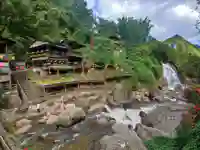

Image Missing
sapa
Getting to know...
Cat Cat is a village 2km from the centre of Sapa town. It takes 30 mins walking to get to. Famous for its waterfall and preserved buildings, this tourist attraction was the first in the region. Three streams named Tien Sa, Golden and Silver pour into the waterfall . Si Bridge and A Lu Bridge are two chain bridges crossing the falls and also the stopping point for tourists to go sightseeing and take photos. Nearby are the giant water wheels made of bamboo that utilise water power to pound rice.
Traditional dancing and music shows
Next to Cat Cat Waterfall, there is the centre house where traditional performances of song and dance are hourly on the hour from 0800-1700 excluding 1200 for lunch. (these times are correct at the time of writing, please check your guide).
Food and drink
There are many cafes and restaurants serving tourists. You can try local food to experience new flavors. Corn wine is also available for the brave. Please be careful as it is quite strong.
Handicraft sellers
The local stone paths are lined with picturesque shops selling local handicrafts and even batik clothing. A perfect place for people to pick up souvenirs to take back home.
Hmong House
When you walk around the village, you will notice that there are many traditional houses that are open to tourists. Traditional houses are unique, each of them have three rooms with three doors and is covered with “Pomu” wood roof. The main door is usually closed and opened only for large events or important ceremonies such as Chinese New Year, Tet holiday, weddings or funerals.
Please note that “Cat Cat Village” is a tourist attraction and is therefore quite busy. Opening hours are from 6 am to 9 pm daily. Tickets cost 150,000 vnd per person. Price includes a handy map to the village with all the times of the local performances.
History
Originally settled by Mong in the early 19th century, the village was later developed as a holiday resort for high ranking officials by the colonial French who named it Cascade after the waterfall. Cascade pronounced locally as ‘Catscat’ later became know as Cat Cat. The French colonials also built a hydro power station here, but it is no longer used as the power it produces is no longer sufficient. It has been preserved however and can still be seen today.
Before 1990, Sapa was a closed off region to the outside world. Cat Cat was the first place to open up to foreign travellers. The village with its traditional houses, waterfall, and cultural shows, captured the interest of these early visitors, who spread word.
By the early 2000s, infrastructure began to improve, making Cat Cat Village more accessible to a wider audience. The Vietnamese government, recognising the potential of Sapa’s tourism, invested in better roads, accommodation, and tourist facilities, contributing to an increase in visitor numbers.